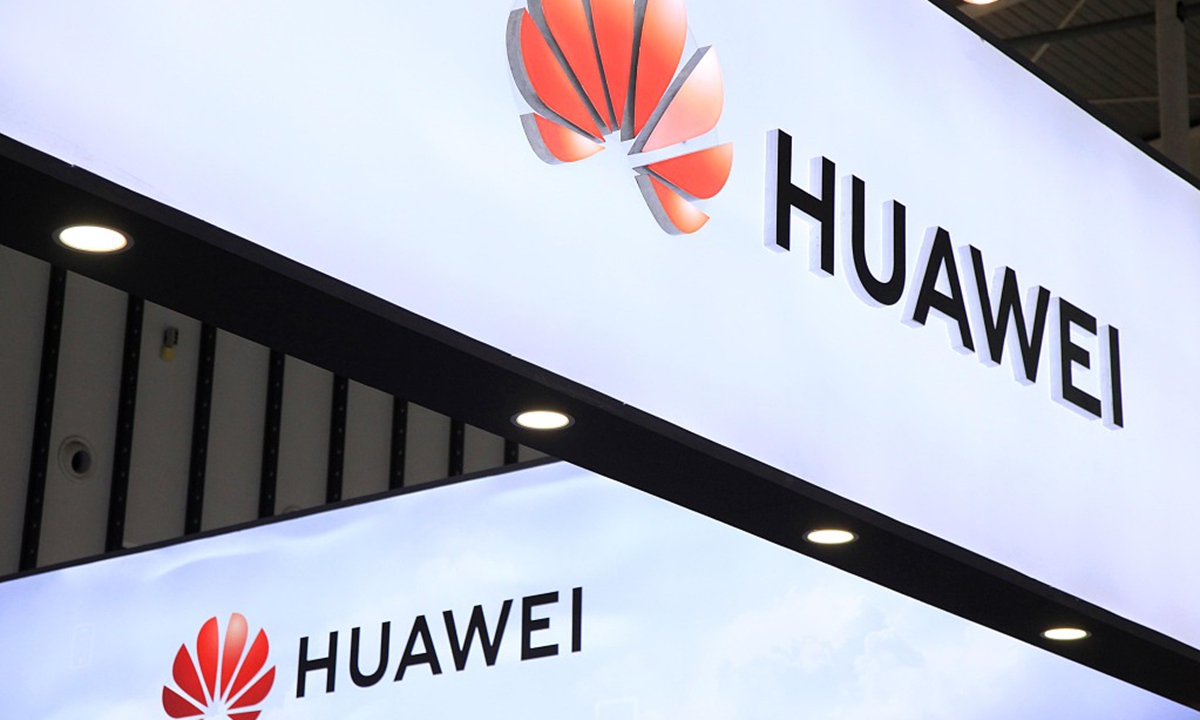Huawei’s lawsuit against Sweden’s 5G ban a vital move to reject political manipulation in Europe: analysts
By GT staff reporters Source: Global Times Published: 2020/11/7 21:26:24

Huawei Photo: CFP
Chinese telecom giant Huawei has appealed Sweden's decision to ban it from the country's 5G network, saying the decision circumvents the legally mandated due process. Analysts called the lawsuit a vital move for Huawei to fight for its legitimate rights in Europe as the company refuses to be manipulated by politics of any country on such issue.
Applauding using legal methods to protect the Chinese firm's rights, analysts said the possibility to win the lawsuit is large for Huawei, and it will have a positive influence on its fate in other European countries, such as Britain and France, if it wins.
Huawei is taking the lawsuit against the Swedish Post and Telecom Authority (PTS) as an example to fight against the discriminatory behavior against the company as it refuses to be manipulated by politics of any country on such issue, Ma Jihua, a veteran telecom industry analyst, told the Global Times on Saturday. "It is taking the case in Sweden as a breakthrough in its rollout in Europe."
"Sweden is a mature society which boasts rule of law. It's reasonable for Huawei to challenge its administrative act by using legal means," Ma said.
The PTS last month barred operators participating in the country's 5G spectrum auction from using equipment from Huawei and Chinese telecom firm ZTE Corp. As a counter strike, Huawei on Thursday submitted an appeal to the Stockholm Administrative Court to reverse the ruling by PTS on October 20. If accepted, this will put an immediate stay on the execution of the PTS' decision and overturn its restrictions on Huawei equipment, the company noted.
"They did not seek sufficient feedback and comments from industry stakeholders before making this decision, and they have yet to provide any legitimate reason for the decision," Huawei said in the statement sent to the Global Times on Saturday, adding Sweden's action lacks "neutrality, independence, and objectivity."
Working closely with partners in Sweden for the past 20 years, Huawei underscored it has never been the source of any serious security incident. "We don't pose a threat to Swedish cyber security; we never have, and we never will," read the company's statement.
It is unclear whether the lawsuit in Sweden is Huawei's first one in Europe regarding the ban on building 5G network and selling 5G equipment to local carriers, but analysts said it would set a good precedent in protecting the Chinese firm's legal rights and fighting for a fair market environment.
Though it is possible for Huawei to win the lawsuit in Sweden, arbitration procedure may proceed slowly, and could take a year or so, said Zhao Junjie, a research fellow at the Chinese Academy of Social Sciences' Institute of European Studies. So Huawei may not be able to bid for the 5G frequency spectrum in Sweden on November 10, according to Zhao.
Attributing Sweden's wrong decision to the US pressure, Zhao told the Global Times that "Sweden gave up its neutrality [on the Huawei issue] as it hopes to rely on the North Atlantic Treaty Organization with the help of the US."
In addition, Zhao called it a misjudgment of the Wallenberg family, a prominent Swedish family renowned for its vast stake in local economy. Wallenberg group is believed to have pressured the Swedish government to ban Huawei and ZTE from the 5G network so Ericsson backed by Wallenberg can profit from Chinese companies' exclusion from the Swedish market, analysts said.
"By striking Huawei, the Wallenberg family handed Ericsson the big deal in Sweden, but it is noteworthy that Chinese market scale is way larger than that in Sweden," Zhao noted.
Analysts warned that the move may cause Ericsson to suffer in the Chinese market.
In addition to Ericsson, Swedish company IKEA may be also concerned with the country's ban on Huawei as it does not want to lose the lucrative Asian market, said Xiang Ligang, director-general of the Beijing-based Information Consumption Alliance.
"Huawei is using different strategies in different European countries to fight against the scrutiny it is facing. If legal means are evaluated to be effective in a country, it will initiate a lawsuit," Xiang told the Global Times, adding the company is also trying to enhance communications with other governments.
Take Britain as an example. Xiang noted if Huawei invested less or slowly in the country, that may reduce jobs for local R&D talent and result in pressure on the British government. The effects of the lawsuit in Sweden remains to be seen in Britain and France, he added.
A report by the research institute, Oxford Economics, published on Friday shows that in 2019, Huawei contributed 16.4 billion euros ($19.47 billion) to Europe's GDP, sustained 224,300 jobs and generated tax revenues of 6.6 billion euros.
In addition, as a R&D leader, Huawei now operates 23 research sites across Europe, and has invested more than $1 billion in its Innovation Research Program, with the involvement of more than 100 research institutions and universities, the report said.
Although it is impossible for the new US government to be nice to the Chinese telecom giant immediately, Britain and France's attitude toward Huawei will change if the US clean network is not preached extensively in Europe after the new US government forms, analysts said.
Posted in: COMPANIES